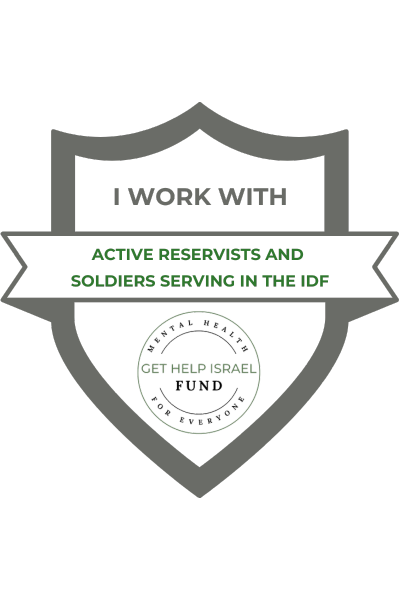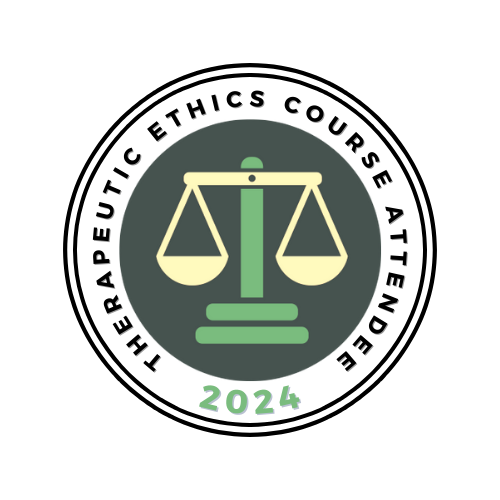Batya L. Ludman
Credentials
Finances
- Mivtza Kadesh 13/9
- Raanana, Israel
Batya L. Ludman
 Verified
Verified
Credentials
Clinical Psychologist
PsyD, F.T.
Finances
350-500 NIS
Private Insurance
N/A
ABOUT THE THERAPIST
I am a licensed clinical psychologist, with over 38 years of therapy and counseling experience in the United States, Canada, and Israel, who has been serving the English speaking community of Central Israel for the past 20 years. I was born in Nova Scotia and received my doctorate from the Ferkauf Graduate School of Psychology of Yeshiva University. I completed my internship and further postdoctoral work in Sex Therapy at the Mount Sinai Hospital and held positions on the faculties of the Mount Sinai School of Medicine, City University of New York and Dalhousie University. I have served on the board of directors of both the provincial psychological association and psychology licensing board, as well as the Chevra Kadisha and emergency disaster response team. I have advanced accreditation as a Fellow in Thanatology (Death Education and Counselling), and additional training in SE-Somatic Experiencing (Advanced), EMDR, CISM ( Critical Incident Stress Debriefing and Management ( Basic and Advanced), and have worked extensively with the American and Israeli communities after 9-11, and other mass casualty events, terrorist incidents and natural disasters. I have given workshops on marriage, parenting, stress management, coping, bereavement, and the psychological impact of terror and trauma. I am published extensively in both the professional and lay literature and have been quoted in Reader's Digest, Modern Woman, Today's Parent, Canadian Family, Jewish Week, The Jerusalem Report, and CNN among others. I have been writing an acclaimed psychology column for the Jerusalem Post since 2000, and am the author of the book, Life's Journey: Exploring Relationships, Resolving Conflicts.
I am married with three children and reside in Ra'anana, Israel where I maintain a private practice in psychology. I work with adults, children, adolescents, couples, families, and groups providing assessment, consultation, and psychotherapy (including short term solution focused and cognitive behavior therapy [CBT], as well as using techniques such as EMDR and SE), as well as bereavement and trauma counseling. Among other issues, I specialize in bereavement/grief and loss, trauma, stress, anxiety, depression, adjustment issues, communication/relationship problems, sexual dysfunction, parenting issues and behavior problems. Please see my website: www.drbatyaludman.com for more details, including my approach to treatment, services provided and a selection of recent publications. .
QUALIFICATIONS
PsyD
Ferkauf Graduate School of Yeshiva University
1984
F.T.
Ferkauf Graduate School of Yeshiva University
1984
Degree
PsyDEducation
Ferkauf Graduate School of Yeshiva UniversityYear of Graduation
1984Degree
F.T.Education
Ferkauf Graduate School of Yeshiva UniversityYear of Graduation
1984Years in Practice
42
Mumche Category
Clinical Psychologist
Mumche License Number
6360
ADDITIONAL CREDENTIALS
Certificate of Completion, Somatic Experiencing Professional Training, 2012
Certified as Fellow in Thanatology: Death, Dying and Bereavement (FT), Association of Death Educators and Counsellors, 2005- Current
Certified in Thanatology: Death, Dying and Bereavement (CT), Association of Death Educators and Counsellors, 2003 - Current
SEE FAR CBT - Mooli Lahad, PhD and GHI - 2025
DISTANCE COUNSELING
Telephone Counseling, Online Therapy
PRIMARY SPECIALTIES
Anxiety / Panic
Behavioral Concerns In Children
Couples / Relationship / Marriage Counseling
Grief
Trauma / Post Traumatic Stress Disorder PTSD
ADDITIONAL SPECIALTIES
Adjustments
Anger Management
Cancer / Terminal Illness
Depression
Family Issues
Life Transitions
Parenting Issues / Training
Psychosomatic Disorders
Self-Esteem
Sexual Issues
Stress Management
Death and Non-death Loss
CLIENT FOCUS
Population
Children
Adolescents
Adults
Couples
Families
Men
Women
Geriatric
Languages Spoken
English
TREATMENT APPROACH
Cognitive Behavioral Therapy (CBT)Cognitive Behavioral Therapy (CBT) is a type of psychotherapy that focuses on how one's thoughts, feelings and behaviors are connected and can be changed. It is based on the idea that how we think (cognition) and how we feel (emotion) can influence how we behave. CBT helps people identify and challenge distorted thinking and replace it with more balanced thinking, leading to improved mood and behavior. ‘Homework’, usually containing practical writing exercises, is often completed by the client between sessions to reinforce the therapy. Examples of tools that practitioners often use are journaling, challenging beliefs, and mindfulness.
Eye Movement Desensitization and Reprocessing Therapy (EMDR)Eye Movement Desensitization and Reprocessing (EMDR) is a psychotherapy treatment that was originally designed to alleviate the distress associated with traumatic memories. It uses a structured approach to address the past events that may be causing current distress, and uses bilateral stimulation, such as eye movements, to activate different neural networks in the brain in order to reduce symptoms of trauma. EMDR has been found to be effective for a wide range of mental health issues, including anxiety, depression, and PTSD.
Gottman MethodThe Gottman Method is an evidence-based approach to couples therapy that is designed to help couples strengthen their relationships and resolve conflicts. This method is based upon decades of research on thousands of couples and utilizes an approach that is both structured and collaborative. The method is designed to help couples increase respect, affection, and closeness, break through and resolve conflict, generate greater understanding, and to keep conflict discussions calm. It emphasizes the importance of self-regulation, constructive communication, and creating a safe environment for couples to talk and work through their issues. During sessions, couples work on skills such as active listening and expressing needs and feelings effectively. Couples are also given tools to identify and work through conflicts by using problem-solving techniques and developing strategies to manage emotions and reduce stress.
Guided ImageryGuided imagery is a form of visualization used for relaxation and healing. It uses the power of the imagination to create positive changes in a person's thoughts, feelings, and behaviors. It is also used to reduce stress and anxiety, cope with physical and emotional pain, increase motivation, confidence, and self-esteem, and to improve focus and concentration. During a guided imagery session, the practitioner will guide the client through a series of visualizations, using words and descriptions to help them create mental images in their mind. These visualizations can take many forms, such as a comforting place from the past or the client’s future goals.
Imago Relationship Therapy (IRT)IRT focuses on helping couples identify and address their unconscious patterns of behavior that contribute to conflict and dissatisfaction in the relationship. IRT also emphasizes the importance of forgiveness and validation in healing past wounds and creating a more positive and fulfilling relationship. IRT helps couples develop communication skills and a deeper understanding of each other's needs and feelings.
Through Imago Therapy, couples will be able to explore their communication patterns, discover sources of conflict, and create new ways of connecting with each other that build empathy and understanding. The therapist will also work with the couple to create a vision for their relationship and set realistic goals for how to achieve it. This therapy helps couples to develop better communication, trust, and intimacy, as well as providing hope for the future of their relationship.
Play TherapyPlay therapy is an evidence-based, developmentally appropriate form of intervention used to facilitate emotional, cognitive, and social growth in children. Play therapy is based on the premise that play is the child's natural medium of self-expression and can be used to assess and help a child work through difficult emotions, thoughts, and behaviors. The goal of play therapy is to help children develop the skills and abilities to navigate life stressors, and build self-esteem. During treatment, the therapist creates a comfortable, safe environment (a playroom) for the child to play with as few limits as possible. The toys in the playroom are intended to encourage the child to express his or her feelings and develop healthier behaviors. The child’s “play” with these toys serve as the child’s symbolic words, which may be difficult to express otherwise.
Rational Emotive Behavioral Therapy (REBT)Rational Emotive Behavioral Therapy (REBT), originally developed by Albert Ellis, laid the foundation for what is now known as Cognitive Behavioral Therapy. It is a philosophically and empirically based psychotherapy that focuses on resolving emotional and behavioral problems by identifying and challenging irrational beliefs. Based on the notion that we are typically unaware of our deeply embedded irrational thoughts and how they affect us on a day-to-day basis, Ellis established three guiding principles of REBT. These are known as the ABCs: activating events, beliefs, and consequences. Rewiring old patterns of thinking requires a lot of work and commitment, so active participation and openness in the therapy process is essential to success.
Solution-Focused Brief Therapy (SFBT)Solution-focused therapy is a type of therapy that focuses on what is going right in a person’s life, as opposed to what is going wrong. It is based on the premise that when a person can identify what is working, they can build on it and make positive changes to the areas of their life that need improvement. A therapist using this approach will often ask questions designed to bring out a person’s strengths and resources, rather than focusing on problems or past issues. The aim of this type of therapy is to help people find solutions to their current problems, in order to build a better future. A solution-focused therapist encourages those in treatment to develop a vision of the future and offers support and guidance as they determine the skills, resources, and abilities needed to achieve that vision successfully.
Somatic Experiencing (SE)Somatic Experiencing (SE) is a body-oriented approach to the healing of trauma and other physical and psychological stresses. It is based on the idea that the body is a powerful source of healing and that unresolved trauma can be resolved through the process of bringing awareness and attention to the physical sensations of the body. By gradually and gently guiding individuals through the sensations associated with their traumatic experience, SE can help to restore balance and well-being more quickly and effectively than traditional psychotherapy. SE utilizes the body’s natural ability to regulate and heal itself and supports individuals in developing more resilience and self-regulation. Somatic Experiencing aims to help people move past the place where they might be “stuck” in processing a traumatic event. SE is often used to treat symptoms of post-traumatic stress disorder (PTSD), anxiety, depression, and other mental health issues.
Trauma-Focused Cognitive Behavioral Therapy (TF-CBT)Trauma-Focused Cognitive Behavioral Therapy (TF-CBT) is an evidence-based practice used to help children, adolescents and their parents who have experienced a single or multiple traumatic events. This type of therapy combines cognitive and behavioral strategies to help people process their traumatic experiences, manage their distress, develop coping skills, and restore their sense of safety and well-being. TF-CBT focuses on education and skill-building, creating an environment of safety and trust, and using therapeutic activities to help people understand their responses and control their symptoms. Children are shown how perceptions may be distorted and are given the tools to redesign those perceptions. TF-CBT is a skills-based model, and it requires the child and parent to practice its components in order to be optimally effective. Parents and children are commonly asked to practice skills at home.
Sex Therapy
SERVICES OFFERED
Individual Therapy
Consultation
Couples Therapy
Family Therapy
Hadrachat Horim
Workshops/Educating

 Verified
Verified



